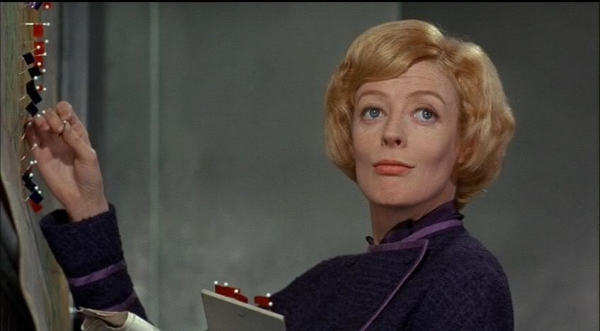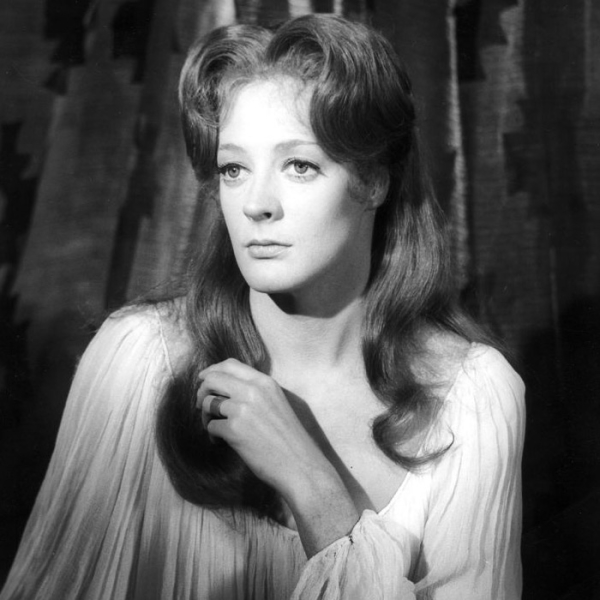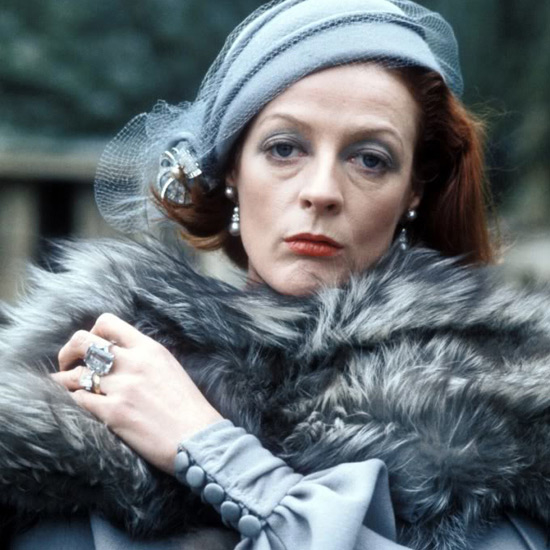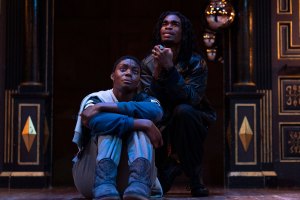Maggie Smith's top 10 theatrical films
Maggie Smith’s biographer Michael Coveney selects ten of her most theatrical films

Everyone has their favourite Maggie Smith film, and it's usually The Prime of Miss Jean Brodie (pictured), for which she won the best actress Oscar in 1969; that is certainly included in the two dozen film and television performances I've selected for the BFI's two-month season spreading across December and January. But for WhatsOnStage readers I've chosen a top ten of rarer and perhaps more surprising theatrical vintage.
It's appropriate, perhaps, to see a little of where her Dowager Duchess of Grantham in Downton Abbey came from, not to mention her Professor Minerva McGonagall in seven of the eight Harry Potter films; she described the prof as Jean Brodie in a witch's hat… and her pension.
For Services Rendered (BBC, 1959)
In this centenary year of the Great War, it is salutary to see Somerset Maugham's very fine, bitter comedy, written in 1932 and performed here "live" (as television drama was in those days) with Maggie as the youngest of three daughters, intelligent and lively, waking up to her own ability to exert power over men, in a country household coping with the post-war fall-out in the Depression. The National revived the play in 1974, and a Salisbury Playhouse production visited the Old Vic in 1979. But this television version established the play as an anti-war Chekhovian classic.

Othello (1965)
Hurriedly filmed in three weeks, based on John Dexter's National Theatre production, with Laurence Olivier giving a titanic but inevitably arch-looking performance as the incensed Moor; you have to think of it as a record of one of the last heroic and romantic stage "turns." It remains for me the best performance I've ever seen in the theatre. Maggie's Desdemona, her first Shakespearean tragic role, is a red-headed beacon of innocence and serenity, though she exclaimed on rushing from Chichester to Shepperton Studios by helicopter that she had never expected to look down between her legs and see Guildford.
Young Cassidy (1965)
Young Cassidy, played by Rod Taylor, is in fact the young Irish playwright Sean O'Casey, and Maggie plays his love interest, Nora Creena, a character who appears, respectfully portrayed, in one of O'Casey's plays, Red Roses for Me, but is here made of much sterner and sexier stuff. In one scene, Cassidy and Nora go to visit Lady Gregory, who co-founded the Abbey Theatre with Yeats; she's played by an imperious Edith Evans – whose great Restoration comedy roles were in Maggie's sights – shortly after they'd not got along very well together in Hay Fever at the National.
Much Ado About Nothing (BBC, 1967)
A real collector's item, though Alan Cooke's television studio production (in black and white) is a two-dimensional version of Franco Zeffirelli's glorious Sicilian revival at the National. But you see Maggie and Robert Stephens at the peak of their relationship (on stage and off) as Beatrice and Benedick, and they're enchanting, and very funny. Watch out, too, for Derek Jacobi, Frank Finlay, Ronald Pickup and a clownish Edward Petherbridge.
Acting in the Sixties/ Bed Among the Lentils (BBC, 1967/ BBC, 1988)
The first on this double-bill is a rare interview with the editor and literary agent Clive Goodwin, complete with clips and lots of ciggie smoking, and a small burst of Kenneth Williams; the second, her sensational, scrubbed down, pared-back-to-the-bone solo turn as Alan Bennett's alcoholic vicar's wife, a role she later played on the stage at Chichester, in the West End… and on tour in Australia.
The Merchant of Venice (BBC, 1972)
Maggie never played Portia on the stage, it's not really her part, but she finds something deeper than priggishness in the courtroom scene with Frank Finlay's furtive, resentful; Shylock. This is a good example of BBC Shakespeare at the time – and nothing like Rupert Goold's upcoming RSC version at the Almeida – with a superb all-round cast of men in tights and painted Renaissance landscapes. What country, friends, is this? It is Messina, lady. (The director was Cedric Messina, a legendary figure in BBC classic drama.)

The Millionairess (BBC, 1972)
Again, this is the sort of classic drama you don't get on television any more, and Maggie is transcendent as George Bernard Shaw's Epifania Fitzfassenden – another great Edith Evans role – the richest heiress in England who, in the 1930s, turns the conditions of her inheritance and marriage prospects into a policy of feminist, socialist intervention. The movie with Sophia Loren and Peter Sellers is a charming diminution of a play here restored to full theatrical vigour in one of Maggie's most glamorous and irresistible performances.
California Suite (1978) Maggie won her second Oscar – as best supporting actress – playing the role of an actress, Diana Barrie, who goes to Hollywood for the Oscars but doesn't win one. To rub salt in the wound, they're playing her movie on the plane trip home. Neil Simon adapted the screenplay from his own Broadway hit, Plaza Suite, and the playing of Maggie and Michael Caine as her bisexual antique-dealing husband, is a joy; Caine said that she gave a master class in comedy acting for the screen. Bill Cosby and Richard Pryor also feature as a couple of loser lawyers.
Suddenly Last Summer (BBC, 1993)
Maggie's first American heroine was Tennessee Williams's bereaved and bewitching Mrs Venable, directed by Richard Eyre, faithfully adhering to the play's one act structure, in stark contrast to the overheated, "opened-out" Katherine Heburn/ Elizabeth Taylor/ Montgomery Clift film version. Eyre's cast is first rate: not just Maggie on scintillating form, but also Rob Lowe as the doctor and the late Natasha Richardson, brilliant as the infatuated cousin of the dead boy for whom she acted as a procuress.
The Last September (1999)
Deborah Warner's first and (so far) only feature film sees Maggie and Michael Gambon at the head of an Anglo-Irish family in County Cork in the 1920s. Civil war is looming, and David Tennant as a young British soldier falls in love with Keeley Hawes, Maggie's niece, who's stuck on a Republican terrorist. It's a lovely film, with a fine script by John Banville from an Elizabeth Bowen novel. And watch out for Fiona Shaw, Jane Birkin and Jonathan Slinger. That's the last two RSC Hamlets in the one film, a good pub quiz question.












